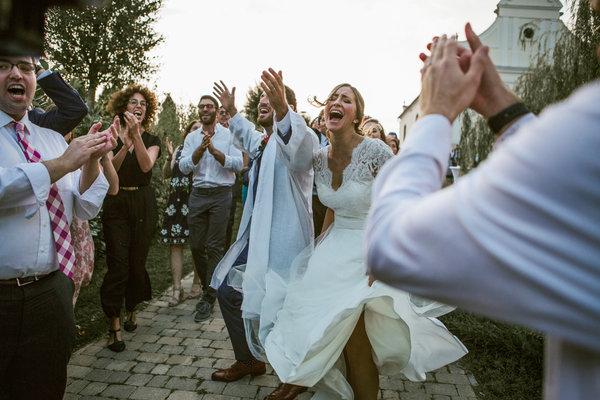Viktoria Bedö and Jonah Chaim Fisher were married Oct. 18 at the Manhattan Marriage Bureau. Angel L. Lopez, a staff member of the New York City Clerk’s Office, officiated.
On Aug. 30, Rabbi Seth Braunstein led a Jewish ceremony at Mad Synagogue in Mad, Hungary. The wedding ceremony at the synagogue was the first since 1944, according to Mariann Frank, a caretaker of the historical site.
Ms. Bedö, 28, is a third-year rabbinical student and Wexner Graduate fellow at the Jewish Theological Seminary of America in New York, and has fellowship through Hillel International’s Office of Innovation. She graduated magna cum laude from Brandeis. She is the daughter of Eleonora Bedö and Erik V. Bedö of Budapest.
Mr. Fisher, 29, works in New York as the director of Gather, a Seeds of Peace program in which he trains and supports entrepreneurs in conflict zones focusing on the Middle East. He graduated from Brown. From 2012-13, through a Dorot fellowship, he studied Arabic in Jerusalem and taught English and Hebrew to Sudanese asylum seekers. He is a son of Pearl Beck and David F. Fisher of New York.
The couple met in July 2016 after Rabbi Braunstein had hired them to work at Camp Szarvas, a summer camp in Hungary that brings Jewish youth together from around the world to focus on rebuilding Central and Eastern European Jewry.
When Ms. Bedö noticed Mr. Fisher hanging out with about 20 campers before breakfast, she walked over to him, and as she leaned in to say, “Hi,” she bumped her head on a rafter of the bunk.
“I could tell there was a certain energy to the encounter,’’ Mr. Fisher said, with a laugh.

CreditSara Petrak
Soon Mr. Fisher, who was in charge of the North American group for the first 10-day session, found ways to sit next to her at meals, and ask questions about her life, her family and why she wanted to become a rabbi.
Ms. Bedö grew up in Budapest in an assimilated Roman Catholic household; Mr. Fisher grew up on the Upper West Side of Manhattan in a Jewish community. “His grandfather was a Holocaust survivor from Munkacs,” she said. “My family is not Jewish and I converted when I was 17,” said Ms. Bedö, who was hired to explore Jewish identity and Jewish experience with the North American group.
Their overlapping interest in Hungarian Jewish past drew them to each other. Ms. Bedö told him when she was 20, she took a mother-daughter trip to the Tokaj wine region where they visited Mad Synagogue on a hilltop. Her mother then predicted she would get married there one day. ”
After the fifth day of camp, Ms. Bedö and Mr. Fisher left the grounds around midnight with another counselor to pick up a treat for Mr. Fisher, whose birthday was the next day.
“We were on a street next to a field eating Oreos, drinking beer and looking at the stars,’’ she said. “We were lying on our backs, and at some point Jonah grabbed my hand.” When they got back to camp, he asked if he could kiss her.
When his parents, who were on a roots trip through Hungary, stopped by the camp the next day on his birthday, Mr. Fisher asked Ms. Bedö to sing during an international music class a Hungarian Hasidic folk song, “Szol a Kakas Mar,” which his grandfather used to lead his family in singing at Passover seders.
“She gave an Ella Fitzgerald rendition,” he said. “They were smitten.”
After camp ended Mr. Fisher invited Ms. Bedö to spend Sabbath with him and his parents still in Budapest before he headed back to Tel Aviv to work, and she went to another Jewish camp in Wales.
“Both of us felt this is something very special, and very complicated,” Ms. Bedö said. Before he left, she recalled him saying, “If our life paths need to cross again they will.” She also recalled thinking, though not saying, “Oh come on. That’s not how life works.”
But by the end of August, after many messages and FaceTime calls, they had committed to a long-distance relationship — she in New York, he in Tel Aviv — and traveled to each other every chance they got.
In January 2018, he proposed and her mother’s earlier prediction was about to come true.
On Aug. 30, Mad Synagogue, which was built in the Baroque style in 1795, was decorated with flowers and filled with joy. About 215 guests, mostly from New York, a few from Los Angeles, Sweden and Israel, and of course, Hungary, celebrated with blessings, music and dancing.
CreditSara Petrak
The significance of the celebration was noted by many, including Randolph L. Braham, a leading scholar on the Holocaust in Hungary and the director of the Rosenthal Institute for Holocaust Studies at the CUNY Graduate Center in New York.
“The wedding in Mad is both a joyous manifestation of love and a historically important act of remembrance and defiance,’’ he said.
Indeed, Mr. Fisher’s grandfather’s prayer shawl covered the top of the huppah in the courtyard. “My grandfather would tell us, his grandkids, that we were his great victory over Hitler,’’ Mr. Fisher said. “We were able to go back to the place to celebrate as Jews there, in an unabashed way.”
“If there is a truth in the world,” Mr. Fisher added, “this is where Viki and I were meant be together and begin our story.”







